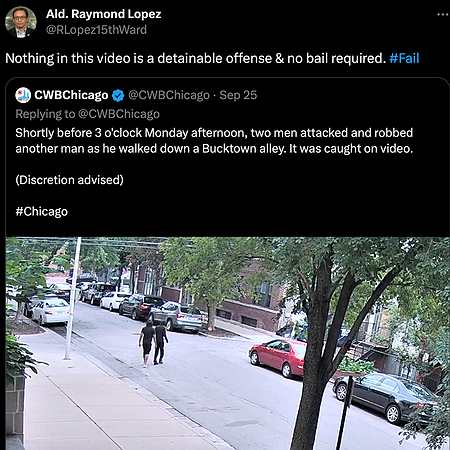Alderman Lopez Stokes Fear Following Mugging in Bucktown
Alderman Lopez shared a video of someone being assaulted and robbed in Chicago’s Bucktown neighborhood and claimed that “nothing in this video is a detainable offense & no bail required.”
The Briefing

The Pretrial Fairness Act permits courts to deny pretrial release to people accused of robbery on the basis of either community safety or evading prosecution.
People Can Still Be Detained Pretrial
While the Pretrial Fairness Act does eliminate the use of money bond as a means to detain someone and mandates that most arrested individuals are given a chance to succeed on pretrial release, it does not eliminate the court’s ability to jail someone awaiting trial.
Section 110-6.1 of the Pretrial Fairness Act outlines the charges for which an individual can be denied pretrial release and outlines the process by which the state can seek detention. After the state petitions the court for denial of pretrial release, the court may deny release due to a safety threat to any person or persons on the basis of several charges, including the most common violent felonies, all sex-related charges, all domestic violence charges, and most forms of gun-related felonies. The full list is below:
All non-probationable, forcible felonies (the most common are murder, attempted murder, armed robbery, home invasion, and vehicular hijacking);
All sex crimes (all forms of criminal sexual assault, criminal sexual abuse, child pornography related charges, and various charges relating to sexual misconduct with children and human trafficking);
All domestic violence charges (misdemeanor and felony domestic battery and violations of orders of protection); and
All non-probationable gun-related felonies (including all forms of discharge of a firearm, sale of firearms, and most forms of possession of a firearm).
In addition, anyone accused of any Class 3 felony or above may be denied release if the state requests it and the court finds they have a risk of willfully avoiding prosecution. Not only can anyone accused of the above offenses be denied release after their first arrest, people who were previously released may have their release revoked if they violate the conditions of that release or are accused of a new crime.
What is the Pretrial Fairness Act
In February 2021, Governor JB Pritzker signed the SAFE-T Act (Public Act 101-0652) into law. Included in the legislation is a set of provisions relating to arrest, pretrial release, and pretrial incarceration known as the Pretrial Fairness Act. The Pretrial Fairness Act makes Illinois the first state to fully eliminate money bail. The law was passed in response to the Black Lives Matter protests of 2020, which followed years of organizing led by the Illinois Network for Pretrial Justice that mobilized thousands of people across the state in the fight for pretrial fairness.
The Pretrial Fairness Act will ensure that everyone has access to the presumption of innocence—regardless of their financial status—and reduce the number of people jailed while awaiting trial in Illinois. When people are jailed, even for short periods of time, their lives are significantly destabilized. Time in jail causes people to lose jobs, custody of their children, and housing. This destabilization impacts entire communities and makes all of us less safe in the long run. People who spend any period of time in jail are over 30% more likely to be arrested in the future compared to people with the same backgrounds who are released awaiting trial. People who are jailed pretrial also receive longer prison sentences than similarly situated people, further contributing to mass incarceration.
The Pretrial Fairness Act replaces the current wealth-based system, which relies almost exclusively on how much money a person can access, with a new decision-making system that determines pretrial release or detentions based on an evaluation of whether an accused person poses a threat to another person or is likely to intentionally avoid prosecution.







